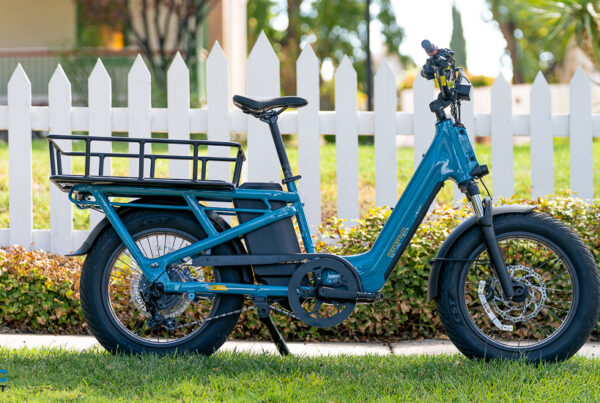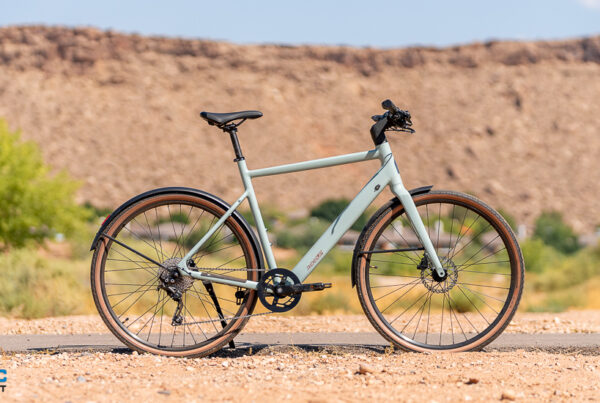Some links may be affiliate links. We may get paid if you buy something or take an action after clicking one of these.
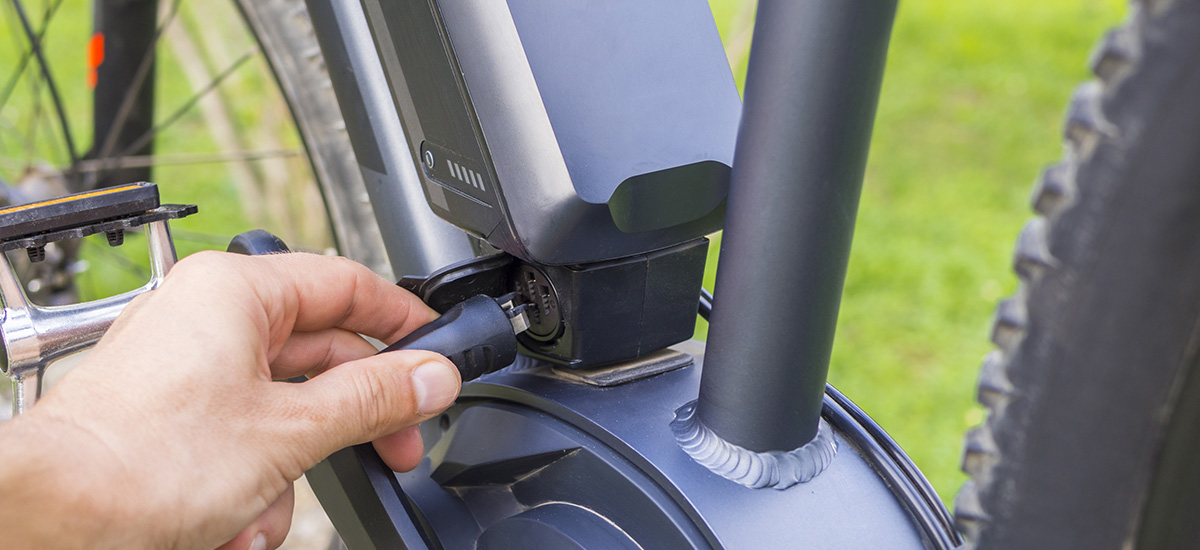
How much electricity does an e-bike use?
The best way to answer this question is to look at the amount of energy e-bikes typically use and to compare that to other means of transport to show just how economical they are in power consumption terms – very little by most measures!
Comparing watts is the best way of measuring and comparing when answering the question; it’s really handy as not only is it a measure of electrical energy but it’s also a measure of energy consumed by any type of movement, from walking to flying and everything in between. As watts is a measure of instantaneous power, watt-hours are an even more useful measure – they are simply the number of watts an e-bike (or anything else) consumes in an hour – hence watt hours (Wh).
Watt hours are also commonly used to measure how much electrical energy is in an e-bike battery. 1000 Wh batteries are large for an e-bike but not uncommon. For ease of comparison let’s assume a 1000Wh (or 1 kilowatt hour – kWh) e-bike battery can take a single rider 100km (around 60 miles) – that’s quite feasible based on the many real-world tests EBR has done with our electric bike reviews.
Now let’s compare that measure of traveling 100km on 1kWh of electricity to other ways of getting around in the following graphic, all based on figures found at the Without Hot Air website.
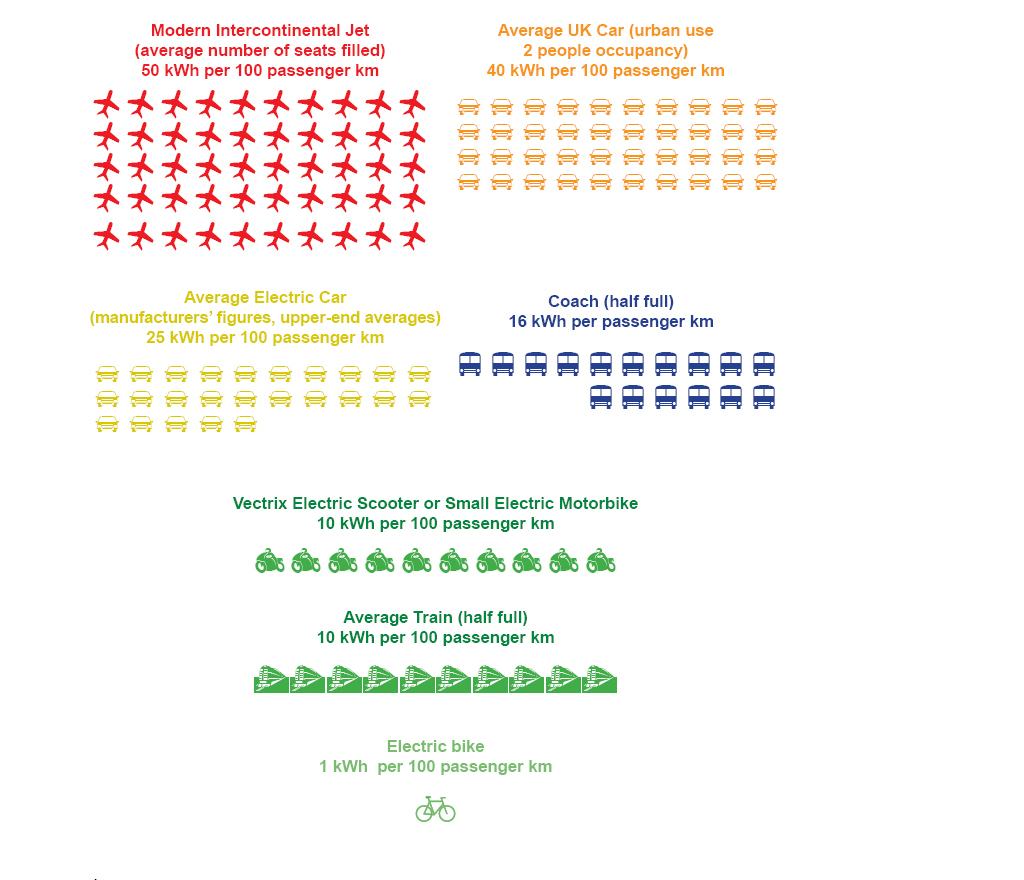
Of course, many of the other means of transport here don’t use electricity but they all use energy extracted from various fuels at rates that can be equated to kWh. So an e-bike uses around one twenty fifth of the electrical energy used by an electric car to move and one fiftieth of the energy used by a plane. These are of course very rough figures based on averages and assumptions; but the point remains, e-bikes use very, very little electrical energy when compared to alternatives.
Now let’s look at just how much that electricity needed to recharge your e-bike will cost.
How much does it cost to charge your e-bike?
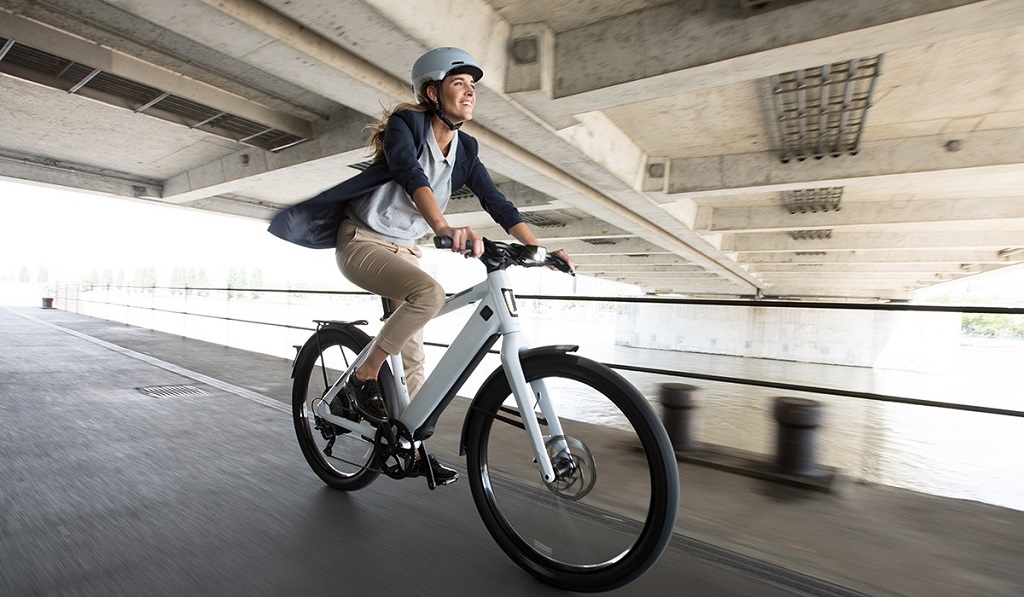
This is a fairly simple calculation on the face of it if you just want to know the cost of charging a battery from empty to full:
(Battery capacity in kWh x 1.25) x cost of electricity per kWh
The 1.25 multiplier is there because not all the electricity that comes out of your wall socket ends up stored in your battery cells. Up to around 20% can be lost due to the inefficiencies of the power transfer – feel that transformer getting warm during charging – it takes electricity to heat it up!
Here is a worked example based on a typically sized 500Wh e-bike battery with a cost of $0.106 per kWh of electricity (according to this Homeserve article the average cost of electricity for US consumers is 10.6 cents per kWh.)
(0.5kWh battery size x 1.25) x $0.106 = $0.066 – that’s right, just over 6.5 cents to fill a decent sized e-bike battery!
Of course the cost of electricity varies dramatically, so let’s take examples from either end of the spectrum and apply them to the above example.
In Hawaii electricity can cost as much as 38 cents per kWH whilst in Louisiana it’s around 7.5 cents, giving the following example costs:
Hawaii
(0.5 x 1.25) x $0.38 = $0.0237 or around 24 cents
Louisiana
(0.5 x 1.25) x $0.075 = $0.047 or less than 5 cents
So, whatever your tariff, it’s going to be a true bargain to refill your e-bike battery!
If you can get a good ‘Time of Use’ electricity tariff things may get even cheaper if you recharge when electricity is cheapest using off-peak hours (though conversely you might pay more than you would on a flat rate tariff during peak hours).
Cost per trip
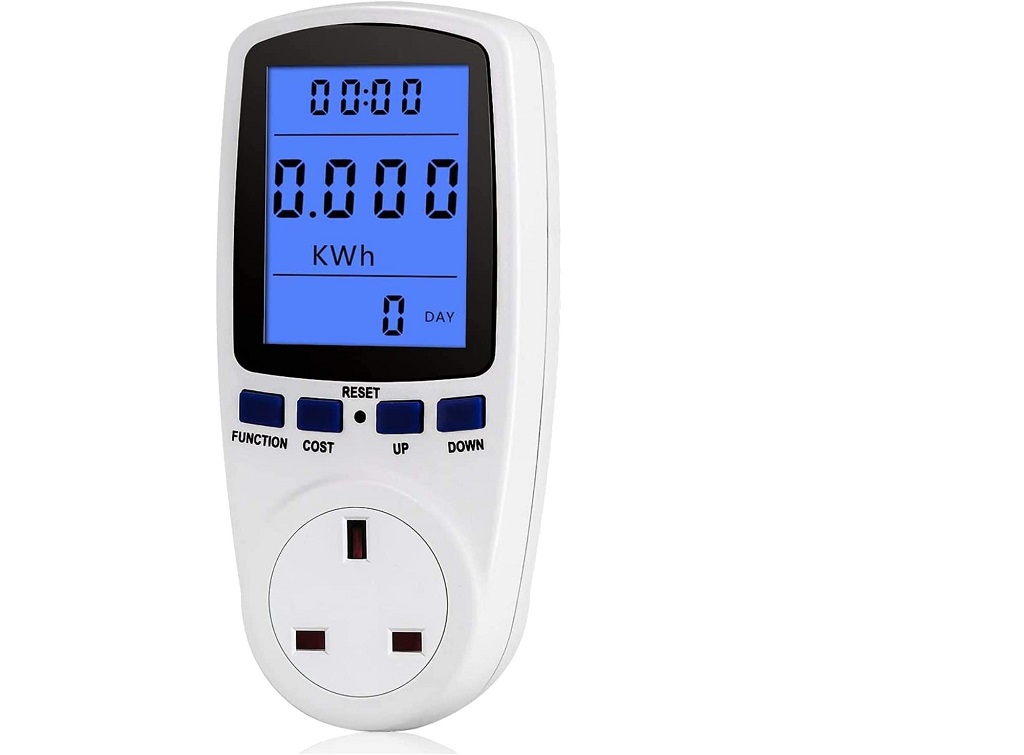
You may find it more helpful to know just how much it costs for a particular trip you take regularly rather than a full recharge.
If you started with a full battery then it’s a very easy calculation but you will need a plug in consumption meter (similar to this one) so that you can measure how many kWh of electricity it takes to fill the battery back up to full capacity.
kWh as measured x cost of electricity per kWh
Taking a typical example of a 15 mile round trip by e-bike, taking 300Wh of electricity at that average figure of 10.6 cents per kWh means a calculation of:
0.3kWh x $0.106 = $0.032 – that’s right, just over three cents worth of electricity for a typical length commuting trip.
Whilst it’s hard to compare this figure exactly with other means of transport – there are so many variables – just take the examples, given by The Points Guy in this articleof public single transit passes in major US cities that vary between $1.25 and $2.75. No contest with an e-bike in terms of cost.
What about the UK?
What about other countries? Does the amazingly low cost of recharging your e-bike hold true there? We picked the UK as an example firstly because EBR has plenty of UK readers but also because electricity prices per kWh are far more than in the US and have just received a serious price hike with a typical figure now being around £0.35 ($0.45) per kWh.
Lets give the same basic example of fully recharging a typically sized 500Wh e-bike battery based on this £0.35 per kWh:
(0.5kWh x 1.25) x £0.35 = £0.22 – that’s around 22 pence (around 30 cents) to fill up, the comparable figure in the US based on an average electricity tariff being just 6.5 cents (5 pence).
So, whilst the cost of refuelling your e-bike in the UK (and many other western European countries) is more than in the US, it remains an amazing bargain. To give one example based on the author’s personal experience; a 500Wh battery would take him around 30 miles on his regular hilly commuting route whilst to do the equivalent by public transport would cost around £6 – nearly thirty times the cost of the electricity used by e-bike for the same trip!
E-bikes vs electric cars

Electric cars are promoted by many governments around the world as the clean, green solution to the climate crisis – e-bikes are often overlooked relative to the very high profile of electric cars.
Whilst it’s clear from the diagram that we introduced this article with that e-bikes use far less energy than electric cars, just how does that translate into charging costs for electric cars? Let’s take a look at a couple of worked examples using the most popular electric cars in the US and UK respectively to find out.
Again, exactly the same formula applies when looking at recharging an electric car from empty to full and we’ll be using those same average kWh costs from the US and UK as before (10.6 cents / 8 pence and 35 pence / 45 cents per kWh). Note this is based on home charging rates – public car charging points will likely be more expensive though faster.
(Battery capacity in kWh x 1.25) x cost of electricity per kWh
Tesla Model Y – US figures
(75kWh x 1.25) x $0.106 = $9.93 (£7.55)
Tesla Model 3 – UK figures (whilst the Model has a 75kWh battery option we have used the smaller 50kWh option as UK cars tend to be smaller on average than US ones)
(50kWh x 1.25) x £0.35 = £21.87 ($29)
Again, no contest!
Also consider the fact that electric cars use far more electricity to cover the same length of journey as an e-bike, so you will be recharging them more often than you would an e-bike battery.
This article gives typical consumption figures for an electric car in the range of 190-290 Wh per mile whilst the typical consumption range of an e-bike is 10-25Wh per mile – so even the most inefficient e-bikes are around eight times more efficient than the most efficient electric cars.
Other e-bike costs
Clearly, as weighted against a purchase price of at least $1000 (more likely a few thousand dollars) the costs of recharging an e-bike really are peanuts. Of course, there are also the costs of ‘consumables’ on an e-bike. Whilst most of these are relatively cheap compared to the purchase price of the e-bike, replacement batteries can run to a few hundred dollars.
Whilst investigating the long term total cost of e-bike ownership in detail is beyond the scope of this article, previous comparative analyses (like from the book Electric Bicycles – though it is a little dated and current figures will be quite a lot higher) still suggest that e-bikes are likely to be remarkably competitive in total running costs as measured against all other forms of transport:
- Conventional (non-electric) Bike $ 0.07 – $ 0.09 per mile / £ 0.03 – £ 0.07 per mile
- Electric Bike $0.11- $0.16 p/m /£0.088 – £0.12 p/m
- Small Car $0.42 – $1.91 p/m / £0.32 -£1.45 p/m
- Small Car – local use only $0.84 -$3.37 p/m / £0.64-£2.56 p/m
- Bus ~ $0.55 p/m / ~ £0.40 p/m
- Train $0.26-$0.80 p/m / £0.20p – £0.60 p/m
In short, all the evidence tells you that if you keep e-biking you keep saving money!
Related
Reader Interactions
![]()
Source link






